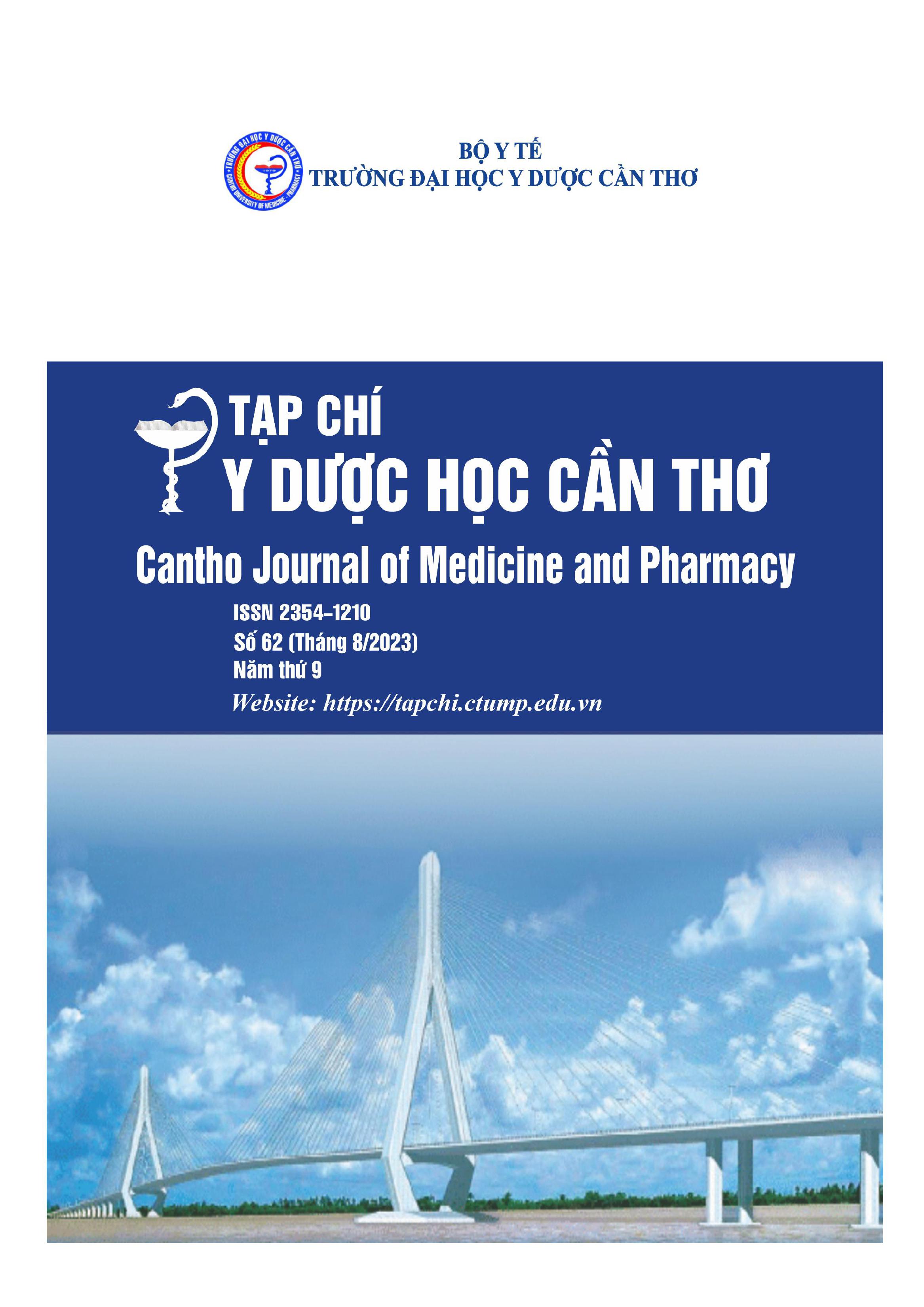RESEARCH ON THE SITUATION, RELATED FACTORS AND EVALUATION OF TREATMENT RESULTS FOR SOME PSYCHIATRIC COMPLICATIONS IN POST-COVID-19 PATIENTS AT CAN THO CITY GENERAL HOSPITAL IN 2022-2023
Main Article Content
Abstract
Background: People infected with Covid-19 experience a range of psychiatric symptoms that persist or appear many months after infection with Covid-19. To inform clinicians of the possible long-term psychiatric consequences of the pandemic to plan treatment and timely intervention for patients. Objective: To survey on the prevalence of depression, anxiety, posttraumatic stress disorder, and sleep disorder among post-Covid-19 patients at Can Tho City General Hospital in 2022-2023. Determining factors related to psychiatric complications of postCovid-19 patients at Can Tho City General Hospital in 2022-2023. Materials and methods: A crosssectional descriptive study with analysis was conducted on patients who came for outpatient examination and treatment at the post-Covid-19 clinic at Can Tho City General Hospital. Results:
The rate of patients with psychiatric complications accounted for 15.8%. The rates of specific psychiatric complications were as follows, sleep disorder 14%, depressive disorder 7.5%, anxiety disorder 10.6%, post-traumatic stress disorder 8%. Through univariate analysis, we found 7 factors that are statistically significant in relation to the dependent variable, which is psychiatric complications in post-Covid-19 patients: Age, gender, occupation, hospitalization, perceived social support scale, infected family, influence of media. Conclusion: Patients with Covid-19 are at risk of psychiatric complications. Regularly assess the mental health of Covid-19 survivors for timely diagnosis and treatment.
Article Details
Keywords
Psychiatric Complications, Covid-19, Can Tho General Hospital
References
2. Chaolin Huang, Lixue Huang, Yeming Wang et al. 6-month consequences of COVID-19 in patients discharged from hospital: a cohort study. Lancet. 2021. 397, 220–232. http://doi.org/10.1016/S0140-6736(20)32656-8.
3. TT, P., B. ME, and B. LA. Targetable biological mechanisms implicated in emergent psychiatric conditions associated with SARS-CoV-2 infection. JAMA Psychiatry. 2021. 78(4), 353-354. doi: 10.1001/jamapsychiatry.2020.2795.
4. Mario Gennaro Mazza, Rebecca De Lorenzo, Caterina Conte. Anxiety and depression in COVID-19 survivors: role of inflammatory and clinical predictors. Brain Behav Immun. 2020. 89, 594–600. http://doi.org/ 10.1016/j.bbi.2020.07.037.
5. Marco Ho-Bun Lam, Yun-Kwok Wing, Mandy Wai-Man Yu et al. Mental morbidities and chronic fatigue in severe acute respiratory syndrome survivors: long-term follow-up. Arch Intern Med. 2009. 169(22), 2142–2147. http://doi.org/ 10.1001/archinternmed.2009.384.
6. Jonathan P Rogers, Edward Chesney, Dominic Oliver et al. Psychiatric and neuropsychiatric presentations associated with severe coronavirus infections: a systematic review and metaanalysis with comparison to the COVID-19 pandemic. Lancet Psychiatry. 2020. 7, 611–627. https://doi.org/10.1016/S2215-0366(20)30203-0.
7. Bộ Y Tế. Hướng dẫn chẩn đoán và điều trị COVID-19 do chủng vi rút Corona mới (SARSCoV-2) cập nhật 28/01/2022.
8. Xiangyu Kong, Kailian Zheng, Min Tang, Fanyang Kong et al. Prevalence and factors associated with depression and anxiety of hospitalized patients with COVID-19. MedRxiv. 2020. https://doi.org/10.1101/2020.03.24.20043075.
9. Amir Moghanibashi-Mansourieh. Assessing the anxiety level of Iranian general population during COVID-19 outbreak. Asian J Psychiatr. 2020. 51, 102076. http://doi.org/
10.1016/j.ajp.2020.102076.
10. Maxime Taquet, John R Geddes, Masud Husain, Sierra Luciano, Paul J Harrison. 6-month neurological and psychiatric outcomes in 236 379 survivors of COVID-19: a retrospective cohort study using electronic health records. Lancet Psychiatry, 2021. 8, 416–427. http://doi.org/10.1016/S2215-0366(21)00084-5.
11. Thor Mertz Schou, Samia Joca, Gregers Wegener, Cecilie Bay-Richter. Psychiatric and neuropsychiatric sequelae of COVID-19 - A systematic review. Brain Behav Immun. 2021 97, 328-348. http://doi.org/ 10.1016/j.bbi.2021.07.018.
12. Jennifer R Chevinsky, Guoyu Tao, Amy M Lavery et al. Late Conditions Diagnosed 1-4 Months Following an Initial Coronavirus Disease 2019 (COVID-19) Encounter: A Matched-Cohort Study Using Inpatient and Outpatient Administrative Data-United States, 1 March-30 June 2020. Clin Infect Dis. 2021. 73(1), S5-S16. http://doi.org/ 10.1093/cid/ciab338.
13. Nader Salari, Amin Hosseinian-Far, Rostam Jalali et al. Prevalence of stress, anxiety, depression among the general population during the COVID-19 pandemic: a systematic review and metaanalysis. Global Health. 2020. 16(1), 57. http://doi.org/ 10.1186/s12992-020-00589-w.
14. Tao Li, Siwei Sun, Bao Liu, Jing Wang, Yalan Zhang. Prevalence and Risk Factors for Anxiety and Depression in Patients With COVID-19 in Wuhan, China. Psychosom Med. 2021. 83(4), 368-372. http://doi.org/ 10.1097/PSY.0000000000000934.
15. Yenan Wang, Yu Di, Junjie Ye, Wenbin Wei. Study on the public psychological states and its related factors during the outbreak of coronavirus disease 2019 (COVID-19) in some regions of China. Psychol Health Med. 2020. 30, 1–10. http://doi.org/10.1080/13548506.2020.1746817.
16. Nguyễn Văn Thảo, Nguyễn Văn Khoe, Ngô Hoàng Toàn, Lê Văn Minh. Nghiên cứu tình hình, các yếu tố liên quan đến biến chứng thần kinh ở bệnh nhân hậu nhiễm COVID-19 tại Bệnh viện Đa khoa kiên Giang năm 2022-2023. Tạp chí Y dược học Cần Thơ.2023. 61.142-147.
https://doi.org/10.58490/ctump.2023i61.1946.


